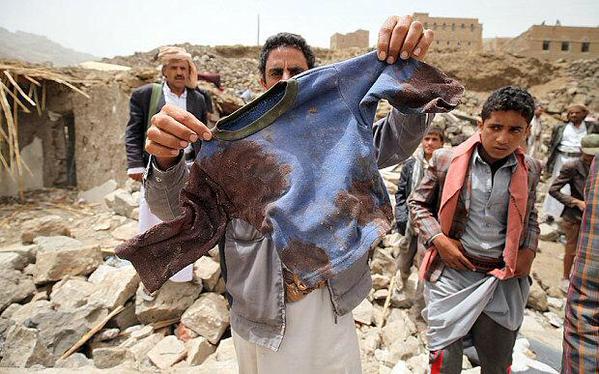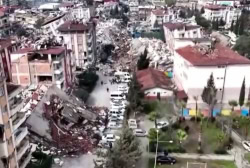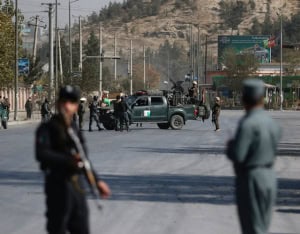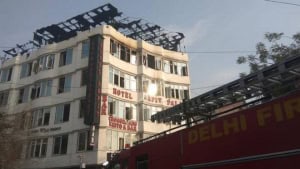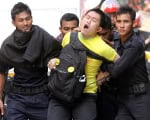ADEN (Web Desk) – Rebels fighting for the control of Yemen and forces backing President Abd-Rabbu Mansour Hadi have engaged in fierce clashes in the country’s south, leaving more than 140 people dead in 24 hours, as the Red Cross faces delays to deliver vital supplies.
The International Committee of the Red Cross and UNICEF plan to fly aid planes into Yemen on Tuesday, but the missions have been delayed as they seek clearance from Arab states waging the air strikes and hunt for planes prepared to fly to Yemen.
ICRC said that one passenger plane carrying staff was able to land in Sanaa on Monday, but that the organisation has not yet been able to find a cargo plane operator to fly supplies into the country.
Sitara Jabeen, the ICRC’s spokesperson, told Al Jazeera that the humanitarian situation was worsening.
“The situation in Yemen remains extremely critical. The conflict … has intensified, especially in Aden. We are still trying to find a cargo plane that can carry our supplies to Sanaa,” said Jabeen, speaking from the Yemeni capital.
“We got permission from the coalition yesterday [to deliver supplies], but so far we have not been able to find a logistical solution to this problem… There are fewer airlines that are flying to Sanaa and the country’s airline itself has suspended flights until further notice.”
Monday’s clashes happened in Aden, a power base for Hadi, who fled to Saudi Arabia as the rebels, known as Houthis, expanded their control across the country.
Citing unnamed officials, an international news agency reported that 17 civilians were among more than 140 people killed in Aden, where fighting continued as rebels tried to seize a port in the city.
However the death toll could not be independently verified.
The clashes came amid reports that Hadi had sacked three of his top military officers. The officers include General Abdullah Khayran, the chief of staff; Deputy Chief of Staff General Zakariah al-Shami and Head of Special Forces General Abdularrazak Almrouni.
Relief workers have warned of a dire situation in the impoverished Arabian Peninsula state, where a Saudi-led coalition is waging an air war on the rebels.
The Saudi-led coalition has bombed Houthi positions since March 26 and has dropped weapons to Hadi loyalists, but the rebels continue to put up resistance and have said they will accept peace talks only if the aerial attacks stop.
Thousands of people in Aden and Sanaa are in desperate need of basic supplies.
Basharaheel Hisham Basharaheel, deputy editor of Al-Ayyam newspaper, told Al Jazeera: “People are running out of food. There is no water. No power supply… The hospitals are in a much worse shape. We see a lot of injured people with no means of saving them. No basic first aid kits, for example.”
At least three Red Crescent volunteers were killed over the past week while evacuating wounded and retrieving dead bodies from the fighting in Aden and in the southern province of al-Dhale, reported the Associated Press news agency. ICRC called the killings deliberate in a statement on Friday.
“There are dead bodies on the streets in Aden. This is why we called for 24-hour humanitarian pause in the fighting so that people can also go and collect the dead,” the ICRC’s Mari-Claire Feghali said.
The Houthis swept into Sanaa in September and put Hadi under house arrest before he fled to Aden and then to Saudi Arabia. Backed by militias loyal to former president Ali Abdullah Saleh, they control large swaths of Yemen, which is also grappling with al-Qaeda.
Saudi Arabia has taken the lead in military operations against the Houthis, backed by air forces from its Gulf allies the United Arab Emirates, Bahrain, Kuwait and Qatar. It says it also has support from Jordan, Egypt, Sudan, Morocco and Pakistan.
Pakistan has yet to spell out what support it will provide, and its parliament was meeting on Monday to discuss what the defence minister said was a request from Riyadh for military aircraft, warships and soldiers.
Food, water and electricity shortages have mounted throughout the country but especially in Aden, where combat has shut ports and cut land routes from the city.
“How are we supposed to live without water and electricity?” pleaded Fatima, a housewife walking through the city streets with her young children.
She clutched a yellow plastic jerry can, like dozens of other residents on the streets and in queues seeking water from public wells or mosque faucets after supplies at home dried up.
